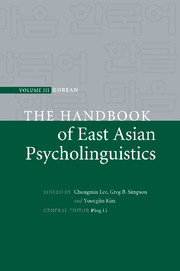Book contents
- Frontmatter
- Contents
- List of figures
- List of tables
- List of contributors
- Preface
- Introduction: Advances in Korean psycholinguistics
- Part I Language acquisition
- Part II Language processing
- 28 Visual processing of Hangul, the Korean script
- 29 English vowel spaces produced and perceived by Americans and Koreans
- 30 Morphological representation and processing of Sino-Korean words
- 31 The role of phonology in word recognition of Korean Hangul and Hanja
- 32 Lexical and sublexical processes in Korean word recognition
- 33 Prosody in sentence processing
- 34 Korean sentence processing
- 35 Sentence processing and memory representation in Korean
- 36 Understanding complex sentences: memory constraints and informational structure
- 37 ERP studies of Korean language processing: word-order effects
- 38 Inferences during discourse comprehension in Korean
- 39 Morpho-syntactic processing in Korean aphasics
- 40 Morpho-syntactic processing of Korean-speaking adults with Broca's aphasia
- 41 Comprehension deficits in Korean agrammatic aphasia
- 42 Developmental reading disorders in Korean
- 43 Individual differences in Korean language processing: context-dependent processing of skilled readers in word ambiguity resolution
- 44 A computational model of lexical and morphological processing in Korean
- References
- Name index
- Subject index
36 - Understanding complex sentences: memory constraints and informational structure
from Part II - Language processing
Published online by Cambridge University Press: 05 June 2012
- Frontmatter
- Contents
- List of figures
- List of tables
- List of contributors
- Preface
- Introduction: Advances in Korean psycholinguistics
- Part I Language acquisition
- Part II Language processing
- 28 Visual processing of Hangul, the Korean script
- 29 English vowel spaces produced and perceived by Americans and Koreans
- 30 Morphological representation and processing of Sino-Korean words
- 31 The role of phonology in word recognition of Korean Hangul and Hanja
- 32 Lexical and sublexical processes in Korean word recognition
- 33 Prosody in sentence processing
- 34 Korean sentence processing
- 35 Sentence processing and memory representation in Korean
- 36 Understanding complex sentences: memory constraints and informational structure
- 37 ERP studies of Korean language processing: word-order effects
- 38 Inferences during discourse comprehension in Korean
- 39 Morpho-syntactic processing in Korean aphasics
- 40 Morpho-syntactic processing of Korean-speaking adults with Broca's aphasia
- 41 Comprehension deficits in Korean agrammatic aphasia
- 42 Developmental reading disorders in Korean
- 43 Individual differences in Korean language processing: context-dependent processing of skilled readers in word ambiguity resolution
- 44 A computational model of lexical and morphological processing in Korean
- References
- Name index
- Subject index
Summary
A small but growing body of research on sentence processing during the comprehension of Korean sentences has begun to contribute important evidence about general principles in sentence processing and aspects of sentence processing that distinguish Korean from the languages that historically have been the primary focus of psycholinguistic research (e.g. Y. Kim, 1999; Lee, Lee & Gordon, 2007). This research complements studies of Korean using more traditional linguistic methods (e.g. I. Lee & Ramsey, 2000; Kang, 2001) as well as complementing the larger body of psycholinguistic research on Korean which has focused on word-level processes (e.g. Simpson & Kang, 1994; 2004, Nam, Kim, Moon & Seo, 1998).
Research on Korean has contributed to the understanding of sentence processing in three important ways: 1) examining whether principles of sentence processing established using other languages can be extended to Korean in a valid way, 2) examining the processing of types of ambiguity or complexity that are present in Korean but not in previously studied languages, and 3) examining the mechanisms of sentence processing by taking advantage of dissociations between different types of information that are more clearly present in Korean than in previously studied languages. Below, we briefly discuss research in each of these types that we have contributed to before providing a more extensive discussion of how recent research on the processing of Korean sentences provides insight into the nature of the memory processes underlying complex sentences and the manner in which sentence processing is guided by informational structure.
- Type
- Chapter
- Information
- The Handbook of East Asian Psycholinguistics , pp. 454 - 462Publisher: Cambridge University PressPrint publication year: 2009



